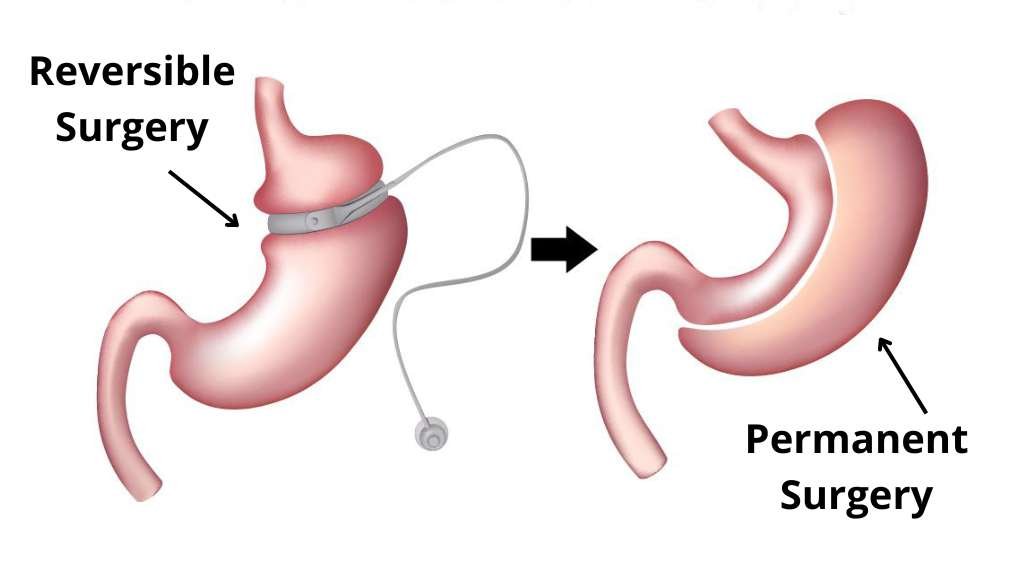Surgeons perform Gastric Sleeve Surgery for individuals who have not achieved desired weight loss through diet and exercise or who have medical conditions related to excess weight. This type of weight loss surgery, also known as sleeve gastrectomy, can greatly benefit those facing challenges with higher weight and weight loss. During the procedure, surgeons remove a large portion of the stomach and reshape the remaining section into a sleeve-like pouch. This reduction in stomach size helps individuals consume smaller portions of food.
The surgery involves making small incisions in the abdomen and using a laparoscope (a small camera) to guide the procedure. The larger part of the stomach is removed, leaving a tube-like structure connected to the intestine. This smaller stomach pouch holds less food, leading to feelings of fullness and satisfaction after eating smaller meals, thereby reducing the accumulation of body fat.
Gastric sleeve surgery is considered minimally invasive, allowing surgeons to use small incisions and specialized tools rather than a single large incision. This approach offers advantages such as reduced pain, shorter hospital stays, and faster recovery times compared to traditional open surgery.
Rising Popularity
Stomach volume reducing surgery, known as gastric laparoscopy, is quite popular nowadays. It is effective in helping people shed weight and improve their health levels. Currently, it is the leading weight loss operation, surpassing other treatments in global performance.
The fame of gastric sleeve surgery is justified by its proven results. Clinical research shows that gastric sleeve patients typically achieve significant weight loss. This leads to improvements in obesity-related health conditions such as type 2 diabetes, high blood pressure, and sleep apnea.
While all surgeries have risks, performing laparoscopic sleeve gastrectomy by experienced surgeons in a government-recognized medical facility ensures safety. It remains a safe procedure with a low incidence of complications.
Moreover, the side advantages of gastric sleeve surgery as compared to other weight-reducing surgeries are also tremendous. Unlike gastric bypass surgery, gastric sleeve surgery does not involve rerouting the intestines, which reduces the risk of malnutrition and related complications.
In simple terms, gastric sleeve surgery is popular among people struggling with higher weight because it effectively improves lives. It enhances safety and provides significant weight loss benefits. As more people become aware of these advantages, gastric sleeve surgery is likely to remain a preferred option for managing obesity and achieving weight loss goals.
Understanding Obesity
The Epidemic of Obesity
Today, the problem of obesity is a great challenge confronting the majority of countries in the world. It ensues when a person has excess body fat which unfortunately can have consequences for their health. Within the past few decades, obesity rates have increased rapidly among people of all ages, genders and socioeconomic backgrounds.
Several factors contribute to the obesity epidemic, including:
- Poor Diet
Diets high in excessive calories, processed foods, sugar, and unhealthy fats contribute to weight gain and obesity. Fast food, sugary drinks, and snacks are readily available, easily accessible, and affordable, making them attractive options for many people. - Sedentary Lifestyle
Modern activities like automobiles, computers, and televisions are the primary cause of the physical activity levels declining nowadays. Some people are working whole day and sit all day long in front of their computers or desks. It is associated with fewer calories burned and weight increase. - Environmental Factors
Construction of the closeness including to healthy products and opportunities for the physical activity influences obesity rates. In lots of townships, people have for a long time struggled to find many fresh, affordable fruits and vegetables not forgetting some safe places where they can do some exercise
. - Genetic Factors
Genetics, along with lifestyle choices, plays a significant role in obesity. Some individuals may have genetic predispositions that favor obesity, and their inherent abilities may not be strong enough to maintain a lean and healthy weight.
Health Implications of Obesity
Obesity, regardless of various medical conditions, is linked to a plethora of health implication that can affect most of the body systems. The following diseases are:
- Type 2 Diabetes
Obesity significantly increases the risk of type 2 diabetes, a condition characterized by high blood sugar levels. Excess fat mass disrupts insulin function, complicating the body’s ability to regulate blood glucose effectively. - Heart Disease
Having a higher weight raises the chance of heart disease and stroke by causing hypertension, high blood cholesterol, and atherosclerosis (furring up of the arteries). These circumstances are known to cause myocardial infarctions, cardiac arrests, and other cardiovascular events. - Joint Problems
Weight carriers have the pressure exerted on the joints, the knees, hips, and lower back dominantly. Obesity is one of the most substantial risk factor of osteoarthritis that is a degenerative joint disease that results in pain, stiffness and difficulties in the movement. - Sleep Apnea
Obesity is common among individuals diagnosed with sleep apnea, a sleep disorder characterized by periods of shallow or halted breathing. People with obstructive sleep apnea may experience daytime fatigue and reduced focus, potentially leading to accidents while driving or at work. - Cancer
Excessive weight correlates with increased risks of developing various cancers like breast, colon, pancreatic, and kidney cancer. The specific mechanisms linking obesity to cancer are complex and not fully understood. They are believed to involve hormonal changes, chronic inflammation, and insulin resistance in the body.
Looking at Weight Loss Solutions
Indeed, both a proper diet and physical activity are crucial for maintaining a healthy weight. However, individuals facing challenges with higher weight that cannot be managed through diet and exercise alone may require bariatric surgery or weight loss operations. Bariatric Surgery, commonly known as Gastric Sleeve Surgery, is the most popular type of bariatric surgery globally.
The inclusion of the Gastric Sleeve Surgery
Gastric Sleeve Surgery involves removing a large portion of the stomach to create a smaller sleeve-shaped structure. This reduces stomach volume, causing individuals to eat smaller amounts until they feel full and satisfied with smaller meals. Additionally, the surgery reduces the production of ghrelin, a hormone that stimulates hunger, helping to suppress appetite and promote weight loss.
Who Can Be A Candidate for Gastric Sleeve Surgery?
Gastric sleeve surgery is often recommended for individuals with a BMI over 40 or up to 35 with obesity-related illnesses like type II diabetes or hypertension. Before opting for surgery, candidates should have explored other weight loss options thoroughly.
The Procedure of a Surgery
Patients undergoing gastric sleeve operation will undergo a detailed assessment first to make sure they are the appropriate ones for the procedure. Anesthesia is administered to the patient in this surgery which usually takes several hours. The surgeon will make several small cuts in the tummy during the surgery and will take out a big chunk of the stomach.
Post Recovery
After undergoing gastric sleeve surgery, patients will receive supervision and pain relief programs in the hospital for a couple of days. During this period, they will receive instructions on how to manage their recovery at home. In the weeks following surgery, patients will adhere to a diet plan starting with clear liquids, progressing to soft foods, and eventually transitioning to solid foods.
Potential Risks and Benefits
Just like any procedure, gastric sleeve surgery has its risks that include hemorrhage, anesthesia related problems or infections. Nevertheless, for lots of people, the advantages of the procedure are more important than the undesirable side effects of the operation. The benefits can range from decreased weight, better general health, to having a higher life quality.
Considerations Before Undergoing Surgery
For those considering gastric sleeve surgery, consulting with a doctor or a bariatric surgeon is crucial. It helps you fully understand the entire procedure. Patients should consider the risks and rewards and prepare to make lifestyle changes to maintain weight loss.
Gastric sleeve surgery can be life-changing for those with severe obesity. However, it’s important to make the decision carefully to ensure it’s the right option for you. With proper guidance and support, this surgery can lead to significant and lasting weight loss. This, in turn, can improve overall health and well-being.













